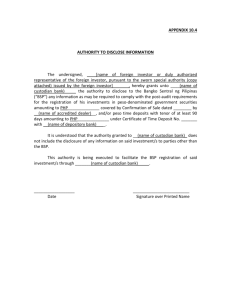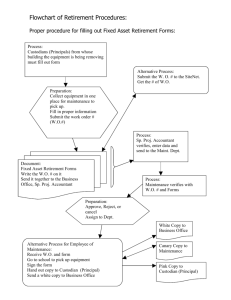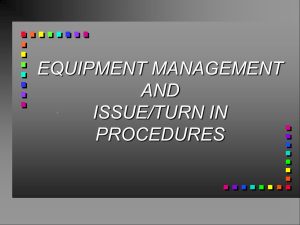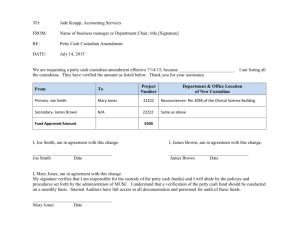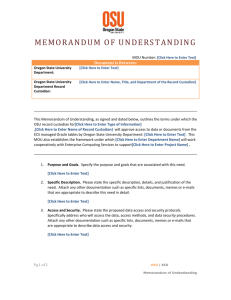LAW DEPARTMENT INTER
advertisement
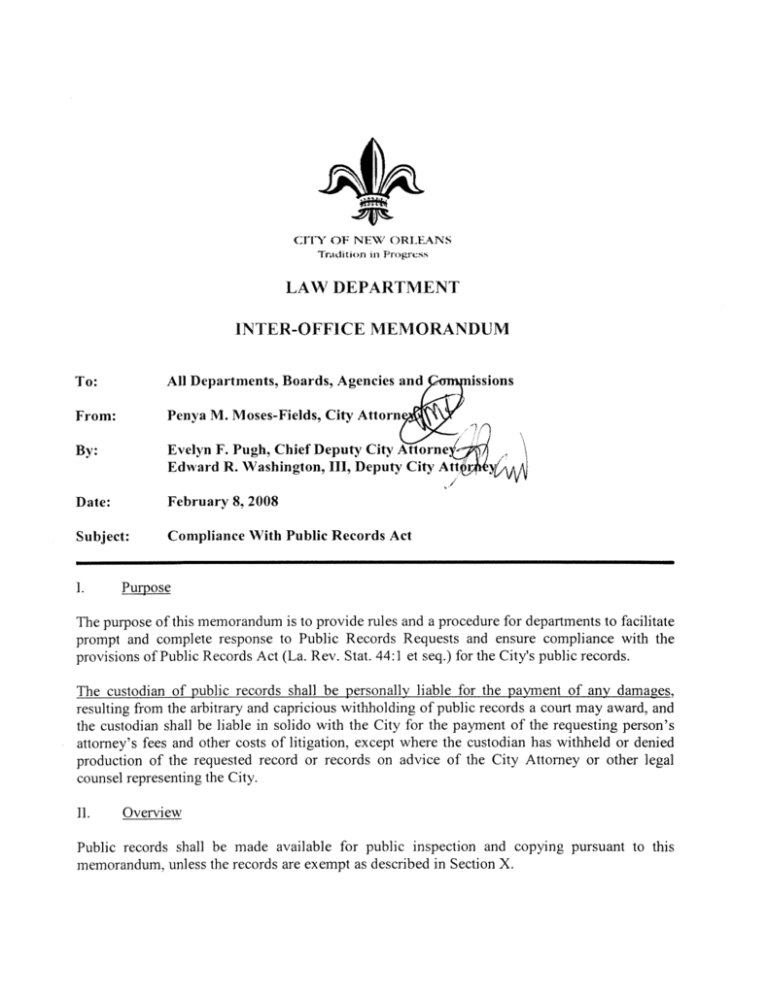
crr OF NEW ORLEANS Trtditiori iii Prgris.s LAW DEPARTMENT INTER-OFFiCE MEMORANDUM To: All Departments, Boards, Agencies and -im nissions From: Penya M. Moses-Fields, City By: Evelyn F. Pugh, Chief Deputy Cit) Mloriic Edward R. Washington, III, Deputy City Aiidiy, Allurnc Date: February 8, 2008 Subject: Compliance With Public Records Act 1. ' / ,., Purpose The purpose of this memorandum is to provide rules and a procedure for departments to facilitate prompt and complete response to Public Records Requests and ensure compliance with the provisions of Public Records Act (La. Rev. Stat. 44:1 et seq.) for the City's public records. The custodian of public records shall be personally liable for the payment of any damages, resulting from the arbitrary and capricious withholding of public records a court may award, and the custodian shall be liable in solido with the City for the payment of the requesting person's attorney's fees and other costs of litigation, except where the custodian has withheld or denied production of the requested record or records on advice of the City Attorney or other legal counsel representing the City. 11. Overview Public records shall be made available for public inspection and copying pursuant to this memorandum, unless the records are exempt as described in Section X. All Departments, Boards, Agencies and Commissions Compliance With Public Records Act Page 2 of 7 III. Procedure All City records that are not exempt from inspection shall be made available for A. public inspection during normal working hours in a manner which does not prevent the conduct of City business. Except as may otherwise be necessary, all records will be produced for review or copying in the Law Department. The custodian shall make no inquiry of any person seeking a public record, except an inquiry as to the age and identification of the person. The right to inspect public records entails the right to make copies. However, the B. person copying the records shall be required to pay for copying costs in accordance with the provisions of section 70-557 of the City Code. The law requires that the records be provided within 3 days of the request or that a response setting forth why they are not available. Persons inspecting public records shall be given a work space to review records C. and shall be provided with reasonable assistance. Copies will be provided upon request. Records may not be removed from the office in which they are stored. Nothing in this policy memorandum shall prohibit providing information to the public by telephone where such is normal and customary. IV. In Person Requests to Visually Inspect Public Records The custodian or department in custody of the records shall make no inquiry as to the reason or purpose for the request. Every person eighteen or older may inspect, copy, reproduce or obtain a reproduction of any public record. The custodian shall request that the requester put their request in writing, which request should be immediately forwarded to the Law Department along with the requested documents as soon as possible for a determination of whether the documents requested are subject to the Public Records Act. V. Written Requests for Public Records The custodian shall write or stamp the date and time of receipt of the written request on the first page of the written public records request and initial it. Thereafter, the custodian shall immediately fax, email or hand-deliver a copy of the request to the Law Department within four (4) hours of receiving the request. The custodian shall also provide copies of the requested records along with a copy of the request to the Law Department within twenty-four (24) hours of receiving the request. if the custodian is not able to provide copies of the records within twenty four hours, the custodian shall inform the Law Department of that fact and the reasons for not being able to provide the requested records. All Departments, Boards, Agencies and Commissions Compliance With Public Records Act Page3of7 VI. Subtioena A. Subpoena Duces Tecum Request in Civil Suits Any department or employee thereof which is in receipt of a Subpoena Duces Tecum shall immediately deliver the subpoena to the attorney on duty in the Law Department along with the requested documents. B. Subpoenas Pursuant to a Civil or Criminal Investigation Any City of New Orleans employee who is served with a subpoena requiring production of any City records as part of a civil or criminal investigation should immediately notify the Law Department and arrange to forward the subpoena for review. In no event should the employee being investigated undertake to comply with or respond in any way to the poena. except to provide the requested records to the Law Department as soon as possible. VII. Copying Machines Persons seeking to copy public records through the use of their own copying machine or scanner shall be allowed to do so as long as such copying does not disrupt normal office procedure and occurs during normal business hours at no charge. VIII. Preservation of Records Unless a special provision of law requires expungement of a particular record, all A. persons and public bodies having custody or control of any public record (other than conveyance, probate, mortgage, or other permanent records required by existing law to be kept for all time) shall exercise diligence and care in preserving the public records for at least three years from the date on which the public record was made, or from the date on which a particular program or project was completed or closed out. However, in all instances in which a formal retention schedule has been ordered by the State Archivist or by Chapter 94 of the City Code, such public records shall be preserved and maintained for any additional period required by the said schedule or Code. Any questions about retention beyond the three year minimum set out in the City Code should be addressed to the Division of Archives, Records Management, and History, in the Office of the Louisiana Secretary of State and/or the City Archives Department of the New Orleans Public Library. Also see City Attorney Opinion No. 91-82 (Request No. 88-6-6) for additional guidance concerning the retention of certain municipal and police related records. A copy of this opinion may be requested from the Law Department. Public records should not be destroyed in cases where the records may be B. involved in actual or potential litigation. All Departments, Boards, Agencies and Commissions Compliance With Public Records Act Page 4 of 7 All existing records or records hereafter accumulated by the various departments C. of the city which participate in federal programs or receive federal grants may be destroyed after three years from the date on which the records were made (or the particular program or project was closed out), unless a retention schedule prescribed by the state archivist or guidelines for the operative federal or state program (or grant) or the City Code requires longer retention periods for the records in question. However, such records shall not be destroyed in any case where litigation with reference thereto is pending or might arise, or until the appropriate city, state or federal audits have been conducted. No records of the City shall be destroyed unless the custodian has determined, in consultation with the New Orleans Public Library, that the records are unsuitable for transfer to the City Archives, pursuant to Chapter 94 of the City Code. IX. Attorney Work Products The Public Records Act does not apply to writings, records or other accounts that reflect the mental impressions, conclusions, opinions or theories of an attorney or an expert, obtained or prepared in anticipation of litigation or in preparation for trial (See LSA-R.S. 44:4.1(C)). Additionally, this exemption also normally applies to City employees, agents, a surety, or indemnitor involved in such litigation (LSA. C.C.P. Article 1424). The Law Department shall be contacted immediately by the record custodian if a request is received which the custodian reasonably believes falls within this exemption. The custodian shall provide a written response within three working days to the requesting person. X. Personal Liability If the court finds that the custodian arbitrarily or capriciously withheld the requested record or unreasonably or arbitrarily failed to respond to the request, it may award the requesting person any actual damages proven to have resulted from the actions of the custodian except as hereinafter provided. In addition, if the court finds that the custodian unreasonably or arbitrarily failed to respond to the request, it may award the requesting person civil penalties not to exceed one hundred dollars per day, exclusive of Saturdays, Sundays, and legal public holidays, for each day the records were not available for inspection. The custodian of public records shall be personally liable for the payment of any such damages, resulting from the arbitrary and capricious withholding of public records a court may award, and the custodian shall be liable in solido with the City for the payment of the requesting person's attorney's fees and other costs of litigation, except where the custodian has withheld or denied production of the requested record or records on advice of the City Attorney or other legal counsel representing the City. Xl. Excepticn The following types of records are exempt from disclosure under the Public Records Act and need not be made available for public inspection: All Departments, Boards, Agencies and Commissions Compliance with the Public Records Acts Page 5 of 7 Exception For Tax Returns and Tax Files (See LSA-R.S. 47:1508, LSA R.S. 44:4(1)) Exception For Records Of Prosecutive, Investigative, and Law Enforcement Agencies. (See LSA-R.S. 44:3) Exception For Records Of Old Age Assistance. Aid To The Blind, Or Aid To Dependent Children (See LSA-R.S. 44:4(2)) Hospital Records (See LSA-R.S. 44:12) Excçpticn For Certain Personnel Record (See LSA-R.S. 44:11.) RegistratioApd QRecords Of Libraries (See LSA-R.S. 44:13) Risk Managemcnt Files (See LSA-R.S. 44:4(15)) Records of Violations, qpicjpal Ordinanç (See LSA-R.S. 44:9) ployr Drug Testing (See LSA-R.S. 44:11) Other Exemp JcQri (See LSA-R.S. 44:4.1) XII. Glossary "Public Records" are defined as all books, records, writings, accounts, letters and letter books, maps, drawings, photographs, cards, tapes, recordings, memoranda, and papers, and all copies, duplicates, photographs, including microfilm, or other reproductions thereof', or any other documentary materials, regardless of physical form or characteristics, including information contained in electronic data processing equipment, having been used, being in use, or prepared, possessed, or retained for use in the conduct, transaction, or performance of any business, transaction, work, duty, or function which was conducted, transacted, or performed by or under the authority of the constitution or laws of this state, or by or under the authority of any ordinance, regulation, mandate, or order of any public body or concerning the receipt or payment of any money received or paid by or under the authority of the constitution or the laws of this state. Thus, as a general rule, all print or electronic documents, including drafts or incomplete documents in progress and including photostatic copies, handwritten notes, et cetera, are public records. For example, a handwritten incomplete draft of a letter from a department head to a City contractor regarding his contract, which the department head has brought to his home to work on, is a public record; the same department head's personal gasoline credit card statement, which he has carried to his office in order to mail payment at lunch time, is not. However, the same statement would become a public record if it contained evidence of reimbursable City travel expenses for which the head was seeking reimbursement. All Departments, Boards, Agencies and Commissions Compliance with the Public Records Acts Page 6 of 7 "Custodian" means the public official or head of any public body having custody or control of a public record, or a representative specifically authorized by her or him to respond to requests to inspect public records. Although the custodian may authorize a representative to respond to requests to inspect public records, the custodian may not delegate the responsibility for maintaining the public records. Requests made to employees not specifically authorized to respond to requests shall be referred to such a person and the requesting individual appropriately notified. The custodian shall ensure that records are not altered, removed or destroyed. "Public Body" means any branch, department, office, agency, board, commission, district, governing authority, political subdivision, or any committee, subcommittee, advisory board, or task force thereof, or any other instrumentality of parish or municipal government, including a public or quasi-public non-profit corporation designated as an entity to perform a governmental or propriety function (e.g., the French Market Corporation). The appointing authority of a department, board, agency or commission of the government of the City of New Orleans will be considered the custodian for purposes of compliance with this memorandum and the Public Records Act. "Email and Text Message Records Stored On Computer Systems" E-mail and text messages are text documents which are created, stored and delivered in an electronic format. As such e-mail messages are similar to other forms of communicated messages such as correspondence, memoranda, and circular letters. E-mail use within the municipality shall be used for official business only. Users should take note that the information generated on e-mail may be a public record subject to public inspection. A public record is any information, regardless of physical form or characteristic and including electronic data processing records, made or received in connection with the transaction of public business. Generally, many e-mail messages are temporary communications which are non-vital and may be discarded routinely. However, depending on the content of the e-mail, it may be considered a public record. Some examples of e-mail messages (including messages with attachments) that are public records and therefore covered by these guidelines include: • • • • • • • policies and directives correspondence related to official business work schedules meeting agendas or minutes any document that initiates, authorizes, or completes a business transaction reports drafi documents that are to be reviewed and/or commented upon Other e-mail messages qualify as public records but have extremely limited value. Examples include: • "Call me when you return to your office." $ All Departments, Boards, Agencies and Commissions Compliance with the Public Records Acts Page 7 of 7 • "Can you meet on Thursday?" • "There is an interesting article on this subject at • "Budget requests are due on the 30th,, _____________ Accordingly, employees have the same responsibilities for e-mail messages as they do for any other public record and must distinguish between public records and non-public record information. Personal e-mail messages and announcements not related to municipal business, or copies or of extracts of documents c-mailed for convenience or reference are generally not considered public records. Personal e-mail is not a public record and should be avoided altogether or used sparingly. These non-public record messages should be deleted from files as soon as they have fulfilled their purpose. These are records that are not required to be kept under law or whose preservation is not necessary or convenient to conduct municipal business. "Electronic Records" Records stored in an unusual manner such as on electronic data processing tapes or microfilm should be made available for review. Usually the reproduction of the tape or microfilm will not be a necessity unless that is the only source of the information. If tape, microfilm or a record retained in another such medium is to be reproduced, the applicant must pay the actual cost of reproduction. When a person requests records in an electronic format, the custodian will provide the nonexempt records or portions of such records that are reasonably locatable in an electronic format that is used by the agency and is generally commercially available, or in a format that is reasonably translatable from the format in which the agency keeps the record. If the record is not reasonably locatable or not reasonably translatable into the format requested, the custodian may charge a fee for such customized access. XIII. Inquiries Any questions concerning the intent of this memorandum should be addressed to A. the Chief Administrative Office. Specific questions concerning the Public Records Act should be referred to the B. attorney-on-duty in the Law Department. G:\lnhouse\LW1NHSE\LU-ZR&O\Pub1ic Rccords\PoIicy Memo to PMF 4.doc

